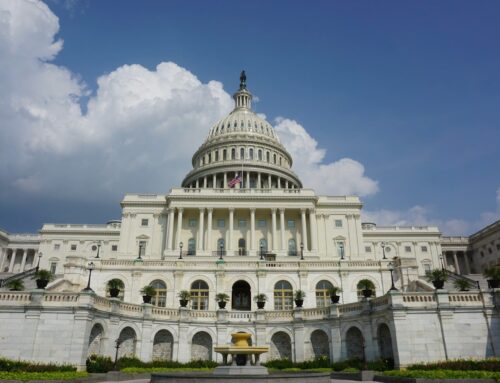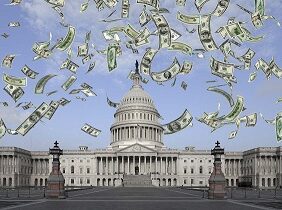On Thursday, the House and Senate agreed to a third continuing resolution (CR) for fiscal year 2024 to avoid a partial government shutdown. This follows the passage of a “laddered” CR in November 2023 that funded the federal government through early 2024. Congressional leaders announced a deal on topline appropriations levels for fiscal year 2024 on January 7, which could pave the way for completion of appropriations in the coming weeks.
Amid these budgetary considerations, Congress is also grappling with the issue of so-called “tax extenders.” The latest installment, “The Tax Relief for American Families and Workers Act of 2024,” spearheaded by Senate Finance Committee Chair Ron Wyden (D-OR) and House Ways and Means Committee Chair Jason Smith (R-MO) was released this week. It introduces modifications to the child tax credit and business tax provisions, as it also perpetuates the cycle of significant, temporary changes to the Tax Code.
The $78 billion tax agreement between Wyden and Smith caps months of negotiation and aims to expand the child tax credit and revive breaks for businesses. However, the legislation still needs to be written into law and secure the votes to pass the Republican-led House, which is not guaranteed. The timeline for this legislation is tight, with the 2023 tax filing season opening on January 29.
While this legislation would ostensibly provide tax relief, its funding mechanism—clawing back unspent funds from the Employee Retention Credit—is more a fiscal sleight-of-hand than a sustainable solution. This move, projected to save $77.2 billion over ten years, essentially reallocates funds from a COVID-19 relief measure rather than creating new revenue streams or cutting spending in a meaningful way. Such tactics, while immediately effective, fail to address the need for long-term, strategic fiscal planning. By relying on the reallocation of previously allocated but unspent funds, Congress continues to sidestep the challenge of finding enduring solutions for funding new initiatives.
This continued reliance on temporary CRs and tax extenders underscores the broader issue of short-termism in American fiscal policy. The repetitive renewal of tax extenders, often without comprehensive evaluation of their efficacy, is a practice that needs to end. Originally a vehicle for economic stimulation, these temporary measures have become entangled with permanent tax law, and their regular Congressional renewal makes them de facto permanent. This habitual practice, institutionalized over decades, underscores a deeper dilemma in American fiscal governance: the persistent penchant for short-term solutions to long-term challenges.
The genesis of tax extenders is rooted in the legislative battles of the 1970s and 1980s, notably the Economic Recovery Tax Act of 1981 under President Reagan. Recent legislative history continues this pattern. The American Taxpayer Relief Act, enacted in 2012, and subsequent acts like the Tax Increase Prevention Act of 2014 and the Protecting Americans from Tax Hikes Act of 2015, have collectively added layers of complexity to the tax code, with costs running into hundreds of billions. The Bipartisan Budget Act of 2018 and the Taxpayer Certainty and Disaster Tax Relief Act of 2019 further extended many “temporary” provisions.
The proposal from Chairs Wyden and Smith continues this trend. While introducing popular modifications to the child tax credit and business tax provisions, it perpetuates the cycle of temporary fixes. This legislation would change how the Child Tax Credit is calculated for tax years 2023, 2024, and 2025, potentially increasing the amount taxpayers can get back. For businesses, it delays the requirement to spread out deductions for domestic research or experimental costs over five years until after 2025. And it extends the use of EBITDA (earnings before interest, taxes, depreciation, and amortization) for calculating business interest deductions until 2026. It also includes provisions for disaster-impacted communities, affordable housing, and measures to increase global competitiveness, including tax relief for U.S.-Taiwan cross-border investment.
Under the guise of addressing immediate needs, tax extenders have become a symbol of fiscal myopia. Moreover, tax extender packages are magnets for wasteful provisions. Incentives for biodiesel and renewable diesel, second-generation biofuel producer credit, special expensing rules for film, television, and live theatrical productions, and the seven-year recovery period for motorsports entertainment complexes are just a few of the tax extenders that are a waste of money yet repeatedly get attached to an extenders package. Each represents a policy initially crafted with a specific aim but now serving as a testament to the government’s reluctance to let go of outdated, wasteful, ineffective subsidies. In some cases, the provisions are retroactively renewed, sometimes by years—meaning their only effect is to subsidize activity that has already occurred.
This propensity for temporary extensions not only complicates tax planning for businesses and individuals but also reflects a broader issue in American political culture: the aversion to long-term, strategic policymaking. By continually relying on extenders, Congress has fostered an environment of uncertainty and inefficiency, hindering both economic growth and fiscal stability. In the context of an ever-evolving economy and changing societal needs, it is imperative that U.S. fiscal policy transcends this cycle of short-termism.










Get Social